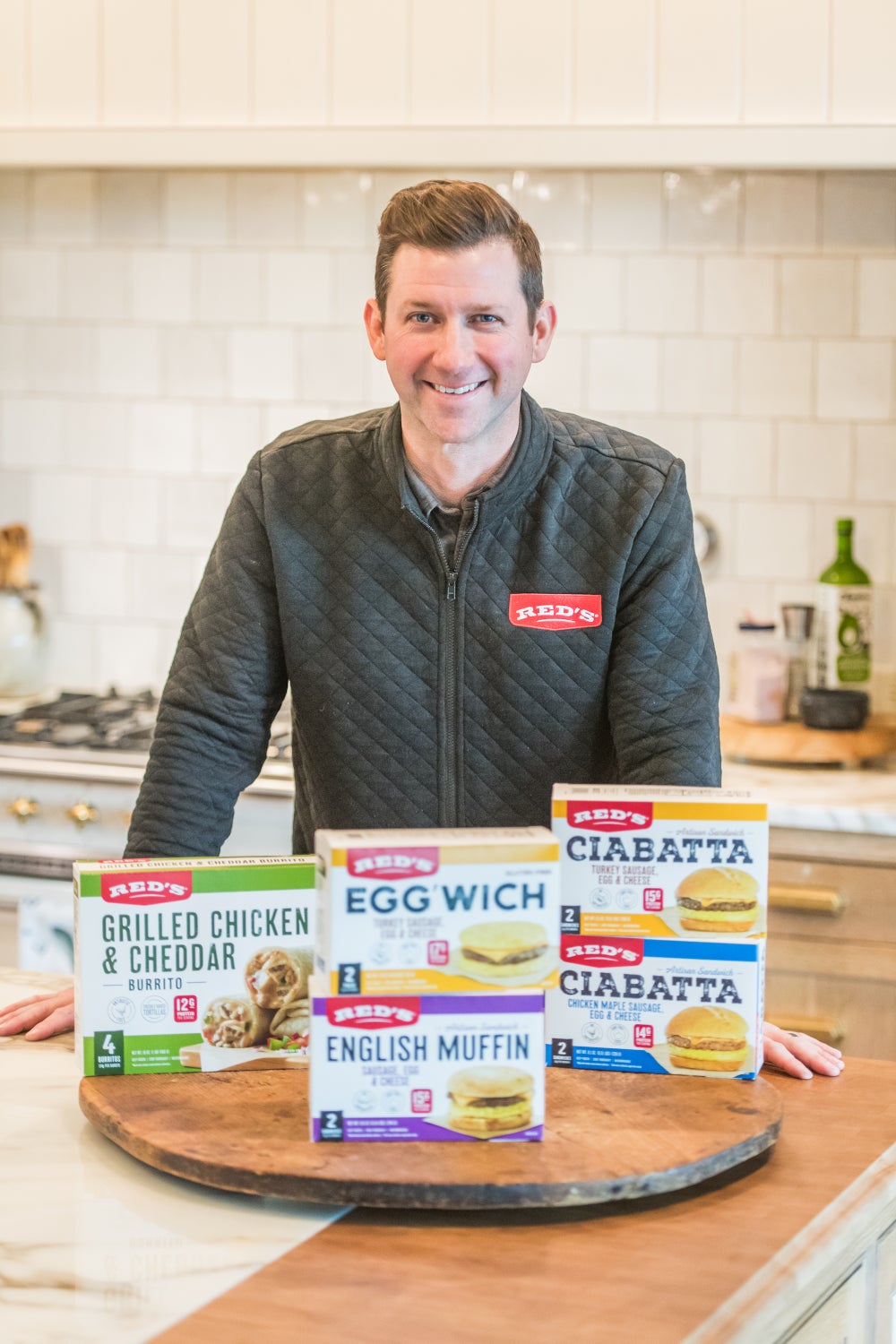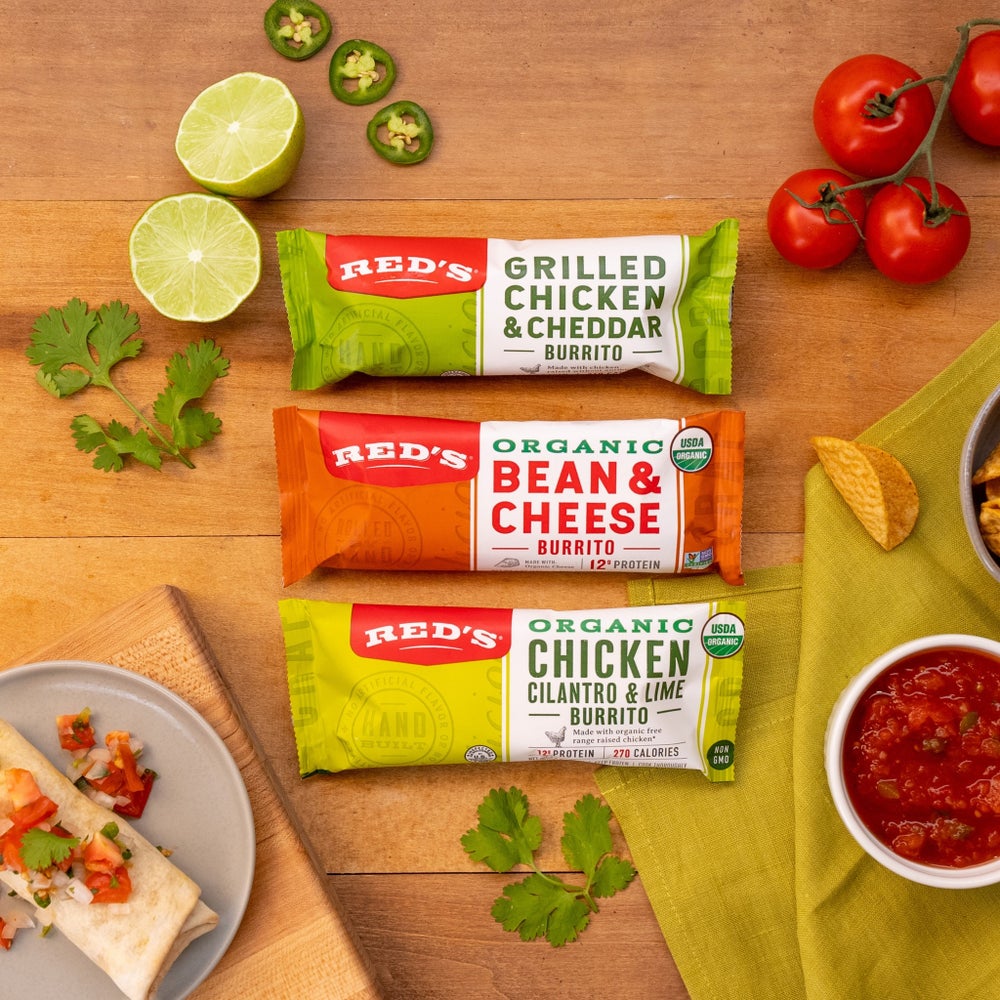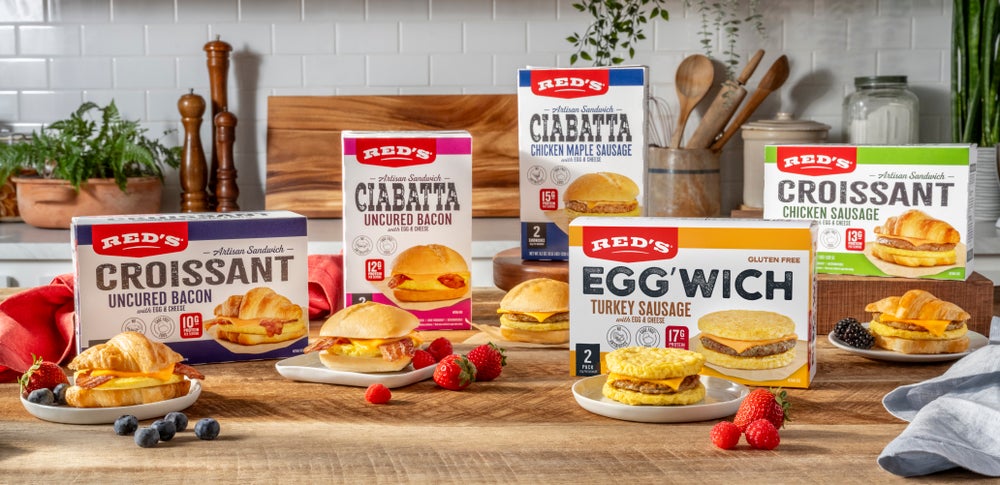After six years of working in a finance role that didn’t excite him, Mike Adair decided life was too short not to be passionate about his day-to-day. ”I just wanted to do something that I [loved],” Adair tells Entrepreneur. “Never in a million years did I think that would lead me to burritos.”
 Image Credit: Courtesy of Red’s. Mike Adair.
Image Credit: Courtesy of Red’s. Mike Adair.
Of course, that’s exactly where it led him: Today, the Franklin, Tennessee-based entrepreneur is the founder and CEO of frozen burrito and breakfast sandwich company Red’s All Natural.
Adair kicked off his entrepreneurial journey by attending business school in New Hampshire and staying “super open-minded” about what lay ahead. The aspiring founder was interested in making a tangible product that would bring people together, and inspiration struck one night as he enjoyed one of his wife Paige’s homemade burritos.
Red’s, named for Adair’s rust-colored rescue dog, was officially born in 2009.
“[I was] running from grocery store to grocery store, trying to sell them and doing a ton of demos on nights and weekends.”
Like most new businesses, Red’s faced some growing pains in the early days of production. Adair had to find a USDA-regulated facility to manufacture the product because it contained meat; that was a challenge in and of itself, he recalls. Then the facility he’d chosen went bankrupt — after a production run of 3,000 chicken burritos for Red’s.
“I had to [go through] the back door and pick up my chicken burritos,” Adair says. “Of course, I did leave a check for the burritos. At that point, I now had a product to sell. So then I started the hustle of putting these in a cooler in the back of my station wagon, running from grocery store to grocery store, trying to sell them and doing a ton of demos on nights and weekends.”
Red’s landed in its first retailer, Walter Stewart’s Market in New Canaan, Connecticut, in 2010.
 Image Credit: Courtesy of Red’s
Image Credit: Courtesy of Red’s
A slew of challenges followed, Adair says — and listening to customer feedback was often the key to navigating them. The founder recalls a lesson learned with the brand’s first offering: an 11-ounce burrito (Adair’s lucky number) that cost about $6 and was challenging to reheat because of its ample size. It was a “rude awakening” when the product sat on the shelves.
People were responding well to the product’s flavor profile, so Red’s pivot kept that intact, downsizing the burrito to lower the price point and increase the reheatable convenience factor. That smaller burrito remains the brand’s biggest seller today. Then, when customers began asking for more, Red’s answered the call again — with breakfast burritos, another massive hit.
After a foray into an entree product was a “total disaster” — the product was quality, but no one was buying — another consumer request came in: Could Red’s make a premium breakfast sandwich? The idea gave Adair pause; Red’s knew how to produce a great burrito, but breakfast sandwiches were a new frontier.
Despite some hesitation, Red’s gave it a shot. Finding a bread that would meet the brand’s standards when frozen, then microwaved, proved difficult, so the solution was an “accidental” super high-protein, gluten-free product — the Egg’Wich with meat and cheese between two egg patties. Later, as air fryers gained traction and provided a method of reheating bread without sacrificing as much quality, Red’s partnered with bakeries to roll out breaded breakfast sandwiches.
“At the end of the day, the consumer’s always right.”
The consumer response has been positive, Adair says. ”We’ve gotten a lot more wrong than we have right,” the founder admits, “but at the end of the day, the consumer’s always right. Our job’s to make a really good product, and if they don’t like it, okay — we need to pivot and figure out the right flavor profiles, price points, everything that works for them.”
About seven years into building Red’s, Adair was ready to tackle one of the brand’s biggest pain points: co-manufacturing.
Adair had never set out to make Red’s the largest food company in the world — it “was never about getting rich” — and co-manufacturing made it more difficult to double down on the business’s original goal: putting out an amazing product that could have a positive impact on people’s lives and foster connection, Adair says.
“You want to make sure that anything and everything associated with a product is done right,” the founder explains, “from all the raw materials that are coming in, to how they’re cooked, how they’re cooled and then how they’re blended together. Every piece of that is so critical to the end product being the highest quality product it can be.”
Red’s opened its first manufacturing facility in South Dakota in 2017.
Related: Want to Manufacture Your Products in America? Three Founders Share Hard Truths On What It Takes.
Getting that manufacturing facility to where it is today — producing the brand’s items sold in Sprouts, Albertsons, Walmart, Target, Costco and other retailers across the U.S. — took a lot of “blood, sweat and tears,” but it’s been “the best decision” for the business, Adair says.
Red’s has grown 200% in the past five years, acquiring one million new consumers in the past year alone, and is on track for $300 million in total revenue, per the company.
Bansk Group, a private investment firm focused on consumer brands, acquired a majority stake in Red’s in 2022.
 Image Credit: Courtesy of Red’s
Image Credit: Courtesy of Red’s
“In order to build a fantastic business, you’ve got to really commit to the process of the people.”
Working with the right retail partners — and learning from the wrong ones — has also been crucial to some of Red’s success, Adair says.
“We went to some retail partners too early,” he explains, “and we failed. Then we had to pause and wait three or four years before we were able to go back with the right products and assortment, after we’d figured out [what went wrong] or learned from our mistakes.”
Adair tells any entrepreneur eyeing a retail launch to begin with two or three smaller retailers that can be strong partners as the business grows. Finding the right retailer for the type of product you’re selling from the start will “exponentially” increase your odds of scaling successfully, Adair says.
Hiring the right people as the company continues to grow remains essential, too, according to Adair.
“In order to build a fantastic business, you’ve got to commit to the process of people, of how you’re going to find them, what support they need, [if you’re] creating the right culture [and] environment for them to be successful,” the founder explains. “[Then it] perpetuates — you start getting five, 10, 15 amazing human beings; they start attracting other amazing human beings. And then it’s like a good virus that spreads.”
Red’s has about 70 employees on its corporate office team now, and “every one of those people is so critical,” Adair says.
As Adair considers the company’s future, he’s excited to continue giving consumers a thoughtful product that makes their busy lives a little bit easier.
“ Everything we do is pretty simple,” Adair says. “We grow high-quality stuff, and then we manufacture high-quality stuff, and then we flash freeze it and provide the best cooking instructions we possibly can so that the consumer can have an amazing experience. We want to do that really, really well in the breakfast category and the snack category. And if we do that, good things will come.”


